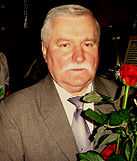Polish presidential election, 1990
| | |||||||||||||||||||||||
| |||||||||||||||||||||||
| |||||||||||||||||||||||
| |||||||||||||||||||||||
 |
| This article is part of a series on the politics and government of Poland |
|
|
|
Related topics
|
|
Politics portal |
Presidential elections were held in Poland on 25 November 1990, with a second round on 9 December.[1] They were the first direct presidential elections in the history of Poland. Before World War II, presidents were elected by the Sejm, in 1952—1989 presidency was absent at all (some of its function were fulfilled by State Council of Poland at that time). The leader of the Solidarity movement, Lech Wałęsa, won the first round. However, he did not earn over 50% of the vote, which led to a runoff election. Wałęsa faced Canadian businessman (of Polish origin) Stanisław Tymiński in the second round, defeating him easily.
Background
Wałęsa was an electrician and union leader with the image of an emotional, shirtsleeves populist. Lawyer and former Solidarity legal advisor Mazowiecki appeared as a more respectable and intellectual leader but also as more of a compromiser. The first non-communist prime minister, Tadeusz Mazowiecki, was very popular and widely considered a front-runner. Despite Tymiński's defeat he had not only humiliated Mazowiecki (one of the best-known and most-respected figures in Polish politics), but also forced Wałęsa (who at that time was a national hero) to endure a second ballot.
The reasons for Tymiński's unexpected success remain unclear. His vague promise to create wealth for everyone quickly, supported by his image as a patriotic Pole who had succeeded abroad, was well received at a time of radical political change and a worsening economic situation. There was increasing disappointment with the trench warfare that had broken out within the former anti-communist opposition so a mysterious, honest and patriotic stranger "straight out of nowhere" had considerable appeal.
Another factor was that Tymiński's use of political-marketing methods unknown in Poland at the time. A key element of his campaign was an omnipresent black briefcase, allegedly containing "secret documents" which would destroy his rivals' careers when the time was right. Although the elections passed without the briefcase being opened, its presence attracted constant attention. Tymiński's adversaries adopted a similar strategy; the daily Gazeta Wyborcza (which supported Mazowiecki) reported that Tymiński had had contact with the secret police, a story that was not withdrawn until after the elections. After the election Tymiński tried to establish a new political party, but quickly disappeared from the political scene in Poland.
Candidates
-

Prime Minister Tadeusz Mazowiecki (Independent)
-

Canadian businessman Stanisław Tymiński
Results
| Candidate | Party | First round | Second round | ||
|---|---|---|---|---|---|
| Votes | % | Votes | % | ||
| Lech Wałęsa | Solidarity | 6,569,889 | 40.0 | 10,622,696 | 74.3 |
| Stanisław Tymiński | Independent | 3,797,605 | 23.1 | 3,683,098 | 25.7 |
| Tadeusz Mazowiecki | Independent | 2,973,264 | 18.1 | ||
| Włodzimierz Cimoszewicz | Independent[a] | 1,514,025 | 9.2 | ||
| Roman Bartoszcze | Polish People's Party | 1,176,175 | 7.2 | ||
| Leszek Moczulski | Confederation of Independent Poland | 411,516 | 2.5 | ||
| Invalid/blank votes | 259,526 | – | 344,243 | – | |
| Total | 16,702,000 | 100 | 14,650,037 | 100 | |
| Registered voters/turnout | 27,545,625 | 60.6 | 27,436,078 | 53.4 | |
| Source: Nohlen & Stöver | |||||
a Although an independent, Cimoszewicz was supported by Social Democracy of the Republic of Poland.
References
- Obwieszczenie PKW z dn. 26 XI 1990 r., Dziennik Ustaw. Nr 83, poz. 483 (Polish)
- Obwieszczenie PKW z dn. 10 XII 1990 r., Dz.U. Nr 85, poz. 499 (Polish)
| ||||||||||||||||||||||||||
| ||||||||||||||||||
